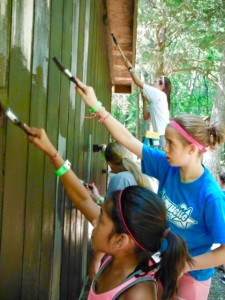Chores and allowance are two of the most contentious issues families contend with. I just realized that taking more responsibility with household work and money are also tops on lists of what couples fight about as well. No surprise kids once again follow our lead.
The best way to avoid power struggles with these areas is running regular family meetings. This becomes the forum for handling problems, discussing pertinent issues, and setting the tone for the home. I even run a camp “family meeting” the 1st day of our summer camps so kids have the ability to have a voice in what activities they do every afternoon and evening. Kids love the forum and being heard and their opinions valued.

Your family will need to learn how to listen to each other, brainstorm win-win solutions, and create consensus. Everyone’s voice is heard and important, there is a lot of give-and-take, and everyone should walk away from the meeting feeling like the new agreement works for them. These are incredibly important life skills that will be transferrable to friendships, dating relationships, and work environments.
Chores should not be a choice; you live in the community and so everyone should pitch in to make it function. Kids like having choices, and so what jobs they do and when should be negotiated in your meetings. Make it clear how you will hold them accountable, and then your job becomes following through with the agreements with no nagging, yelling, or giving in. Most things can be set up where the follow through is time related: “As soon as you do what you committed to do, you can go on with the rest of your day.”
But the key is that you took the time up front in your family meeting to get their buy-in, and so good cooperation naturally follows. Kids learn quickly that there is no give in the system and no payoffs for procrastinating or whining, and so they do what they said they’d do. With a little practice and some experience, it really does become easy.
Receiving an allowance can be an excellent way for kids to learn about money: what things cost, savings, tithing, budgeting, and delaying gratification. Give them an age appropriate amount each month and let them know what they will be responsible for paying. For little kids, it might mean buying toys at the dollar store, or candy at the movies. As they grow older, there will be more responsibilities like paying for their movie ticket and snacks when out with friends, car insurance, buying a car, paying for part of college etc. It’s a great way to stifle the “Gimmee’s”.
Let them know at each stage what they will be responsible for buying, give them enough to play with but which keeps them a little hungry, and then let them loose to learn their lessons. Set up a savings account, teach them how to invest money, and let them make mistakes and learn from them. They will directly learn lessons about delaying gratification and earn self-reliance.

I would suggest you do not tie chores in with allowance. Hold them accountable to following through with their agreements because it’s the right thing to do, not because they will get paid for it. Paying money for chores turns a family obligation into another commercial transaction and kids lose the more important message: helping out at home is about teamwork, service, community, and gratitude.
Use family meetings to set up chores and allowance, to streamline your discipline, and to give kids more say-so, autonomy and responsibility. And your kids will love them.